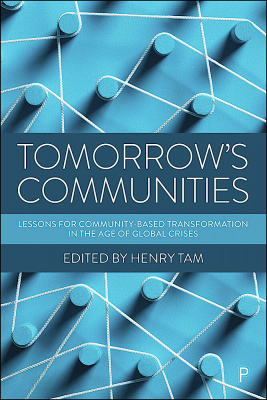Tomorrow’s Communities: Lessons for community-based transformation in the age of global crises, ed Henry Tam (Bristol University Press, 2021, £26.99)
From the explosion of mutual aid in response to Covid-19, to growing interest in Preston-style community wealth building, co-operative ideas have enjoyed a higher profile in recent years, and in compiling this book, Henry Tam hopes to show how these ideas can save our democracy from the reactionary populism of recent years.
Setting out to find policies and practices which can “protect our collective self governance from abuse and manipulation”, he turns to a number of figures familiar to co-operators – such as Ed Mayo, Pat Conaty, Dave Boyle and John Restakis – to explore ways to build community resilience.
Tam warns that political calls to build community can lead to conservative, oppressive policy, and looks for a progressive way forward “away from outmoded thinking and practices” – doing so “not at the expense of close, committed relationships, but on the basis of building such relationships through mutual respect and thoughtful co-operation”.
“Communities must become active agents in shaping and pursuing their priorities in collaboration with their members, other communities and public institutions,” he says.

How do we make this happen? In their chapter, Ed Mayo and Pat Conaty argue for a “virtuous circle” of community economic development, which brings positive social and economic outcomes – and builds confidence, curing communities of a condition of “learned helplessness”; they cite examples from the USA where community initiatives have brought billions of dollars of investment into struggling areas, using models such as the community land trust. In the UK, they point to pioneering initiatives like Coin Street Community Builders, given land to develop by the Greater London Council in the 1980s in response to protests against intrusive top-down redevelopment; the area now has artists’ studios, street markets and co-op housing.
This is a progressive take on the notion of community and Mayo and Conaty set out a number of practical models for achieving it.
In a chapter co-written with Philip Ross, Conaty addresses another problem faced by such communities: the lack of work opportunities and the rise of the exploitative gig economy. Their solutions include encouraging the growth of worker co-ops, drawing on examples such as Smart in Europe and Green Taxis in the US.
There are also instructive looks at how co-operative, community-led models can build resilience through education (Marjorie Mayo), community organising (Steve Wyler) and healthcare (John Restakis) alongside studies of how the model can help drive food justice (Alice Willatt, Rosalind Beadle and Mary Brydon- Miller) and sustainability (Alice Warburton).
Dave Boyle looks at how developing methods of co-production can rethink public services such as healthcare for the better. Noting that the UK’s postwar welfare and health reforms which spring from the Beveridge Report have done little to narrow inequality, he looks at how GP practices have managed to improve outcomes by collaborating with communities on health and wellbeing projects such as allotments. He explores ways to make such project work without them falling under the sway of the government departments or other organisations which fund them.
With a political landscape no less polarised than it was during the upheavals of 2016, and the pandemic adding to the pressures on society that have been building since the 2008 crash, this book offers valuable perspectives on how co-operativism and allied movements can point the way forward.
And if you need to confront any naysayers, there are some striking case studies to demonstrate how it can work in practice, such as the Gloucester motorway services, opened by a community partnership on the M5 in 2014, providing training to 240 long-term unemployed locals, generating wealth that is channelled into local regeneration, helping biodiversity, offering a meeting space, and providing a retail outlet for local produce.
Travellers who take a pit-stop at this pleasant spot should take note that it offers some useful pointers for a journey to a better tomorrow.